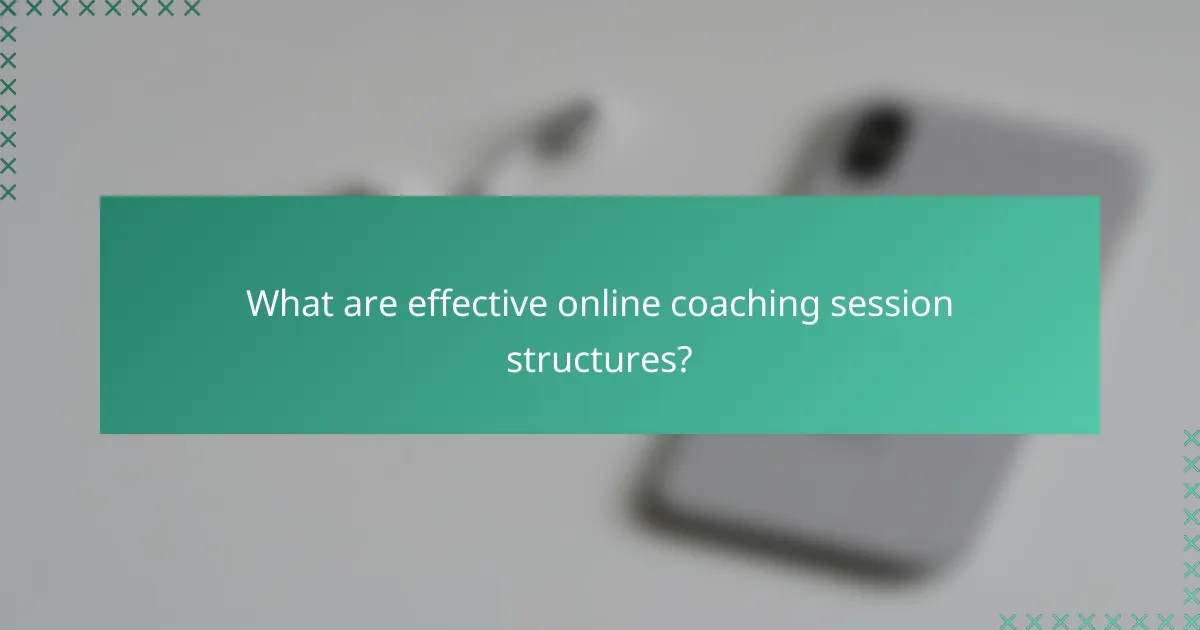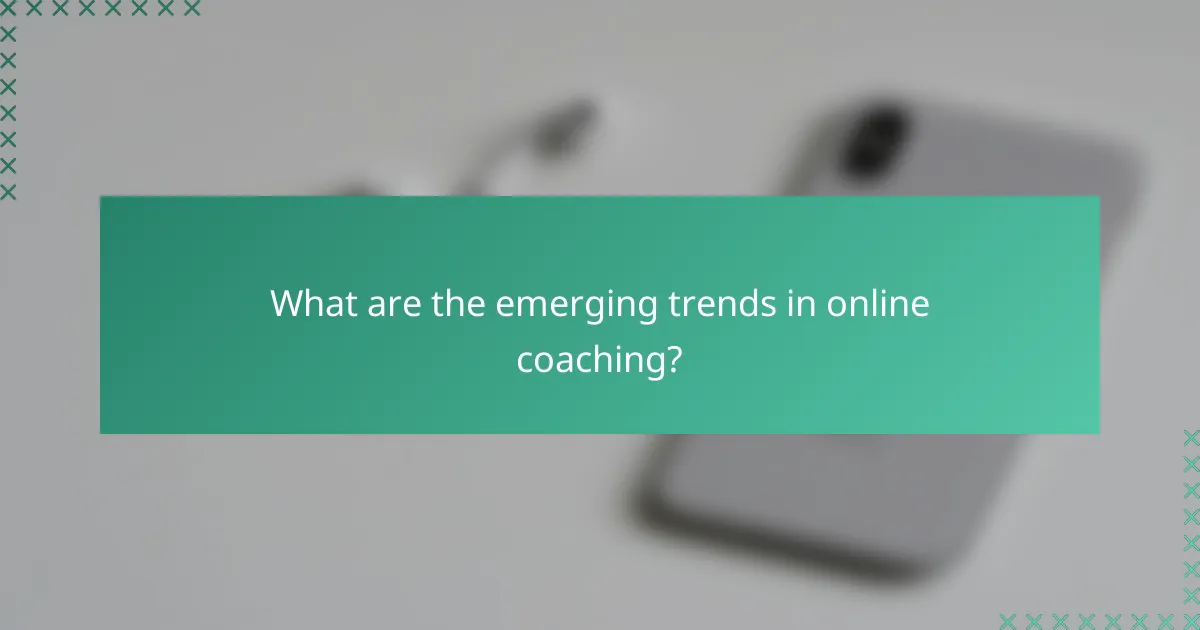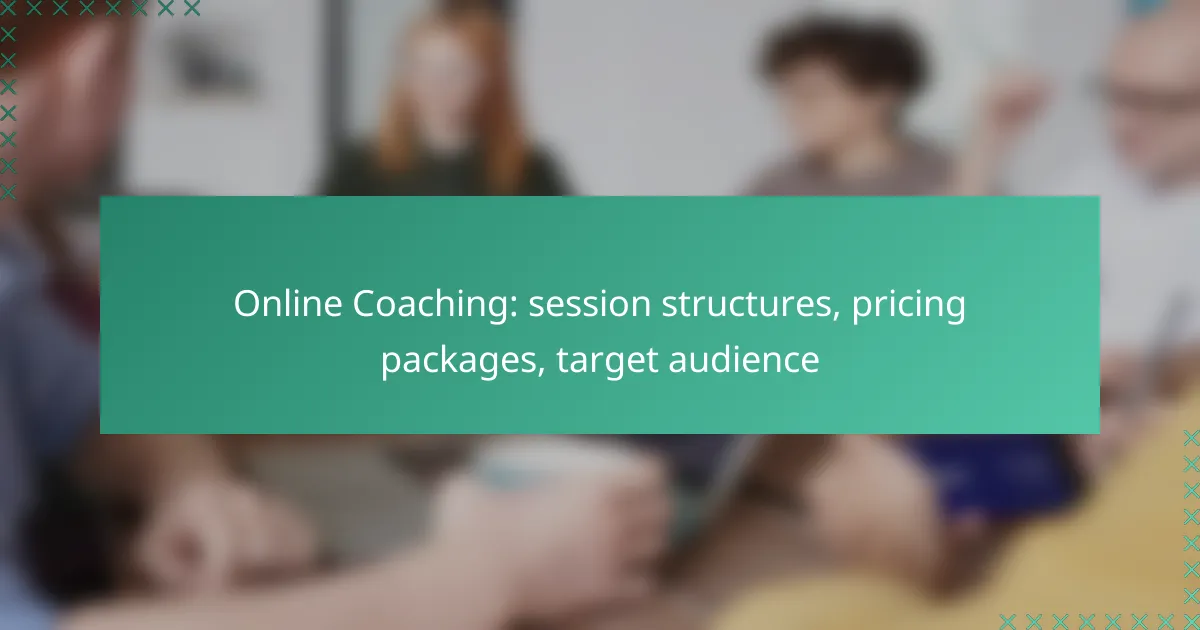Online coaching offers a variety of session structures, including one-on-one, group, hybrid models, and workshops, allowing coaches to customize their approach to meet diverse client needs. Pricing packages can range from affordable hourly rates to comprehensive monthly subscriptions, influenced by the coach’s expertise and the chosen session format. The target audience encompasses individuals from various backgrounds, including professionals seeking career advancement and students needing academic support.

What are effective online coaching session structures?
Effective online coaching session structures typically include one-on-one sessions, group sessions, hybrid models, and workshops. Each structure serves different needs and preferences, allowing coaches to tailor their approach based on client goals and engagement levels.
One-on-one coaching sessions
One-on-one coaching sessions focus on personalized guidance, enabling coaches to address individual client needs directly. These sessions often last between 30 to 90 minutes, depending on the complexity of the topics discussed.
When structuring these sessions, it’s essential to set clear objectives and create a safe space for open dialogue. Coaches should prepare specific questions and materials to maximize the effectiveness of each meeting.
Group coaching sessions
Group coaching sessions bring together multiple clients, fostering a collaborative learning environment. These sessions can range from 60 to 120 minutes and often include discussions, activities, and peer feedback.
To ensure engagement, coaches should limit group sizes to around 5 to 15 participants. This allows for meaningful interaction while still providing individual attention. It’s crucial to establish ground rules to maintain a respectful and productive atmosphere.
Hybrid coaching models
Hybrid coaching models combine elements of both one-on-one and group sessions, offering flexibility in delivery. These models can include alternating between personal sessions and group workshops, catering to diverse learning preferences.
When implementing a hybrid model, consider the balance of individual and collective learning. This approach can enhance accountability while allowing for personalized feedback. Coaches should regularly assess client satisfaction to adjust the structure as needed.
Workshops and webinars
Workshops and webinars are structured events that focus on specific topics, often attracting larger audiences. These sessions typically last from one to several hours and can be delivered live or recorded for later access.
For effective workshops, incorporate interactive elements such as polls, Q&A sessions, and breakout discussions. This engagement keeps participants involved and enhances learning. Pricing for these events can vary widely, so it’s important to research similar offerings to set competitive rates.

How much do online coaching packages cost?
Online coaching packages typically range from affordable hourly rates to more comprehensive monthly subscriptions. The cost varies based on the coach’s expertise, session structure, and the type of package chosen.
Hourly rates for individual coaching
Hourly rates for individual coaching can vary significantly, often falling between $50 to $300 per hour. Factors influencing these rates include the coach’s experience, specialization, and geographical location.
When considering hourly coaching, it’s essential to assess the coach’s qualifications and the value they provide. Some coaches offer introductory sessions at a lower rate to attract new clients.
Monthly subscription packages
Monthly subscription packages generally range from $100 to $500, depending on the level of service and frequency of sessions. These packages often include multiple sessions, access to resources, and ongoing support.
Choosing a subscription package can be beneficial for those seeking consistent guidance and accountability. Many coaches offer tiered packages, allowing clients to select a plan that fits their needs and budget.
One-time workshop fees
One-time workshop fees typically range from $30 to $200 per participant, depending on the workshop’s length and content. Workshops may cover specific topics and provide a more intensive learning experience.
These workshops can be a great way to gain insights without committing to ongoing coaching. Look for workshops that align with your goals and offer practical takeaways.
Discounts for long-term commitments
Many coaches offer discounts for clients who commit to long-term packages, such as six-month or yearly plans. These discounts can range from 10% to 30%, making it more economical for clients who plan to engage in coaching over an extended period.
When considering a long-term commitment, evaluate the coach’s track record and ensure their approach aligns with your objectives. This can lead to a more fruitful coaching experience and significant savings.

Who is the target audience for online coaching?
The target audience for online coaching includes individuals from various backgrounds seeking guidance and support in specific areas of their lives. This can range from professionals aiming for career growth to students needing help with academics.
Professionals seeking career advancement
Many professionals turn to online coaching to enhance their skills and advance their careers. Coaches can provide tailored strategies for improving performance, networking, and leadership skills. For instance, a marketing manager might work with a coach to refine their digital marketing strategies or improve their presentation skills.
When selecting a coach, professionals should consider their specific career goals and look for someone with relevant industry experience. It’s also beneficial to establish clear objectives for the coaching sessions to measure progress effectively.
Students needing academic support
Students often seek online coaching to improve their academic performance or prepare for exams. Coaches can assist with study techniques, time management, and subject-specific tutoring. For example, a high school student struggling with math may benefit from one-on-one sessions focused on problem-solving strategies.
It’s essential for students to choose coaches who have expertise in their particular subjects and can adapt their teaching methods to individual learning styles. Setting achievable academic goals can help students stay motivated and track their progress.
Entrepreneurs launching new ventures
Entrepreneurs frequently engage online coaching to navigate the complexities of starting and running a business. Coaches can provide insights into business planning, marketing strategies, and financial management. For instance, a new startup founder might seek guidance on creating a viable business model or developing a marketing plan.
When working with a coach, entrepreneurs should focus on specific challenges they face and look for coaches with a proven track record in entrepreneurship. Regular check-ins can help maintain accountability and ensure that the business is on the right path.
Individuals pursuing personal development
Online coaching appeals to individuals interested in personal growth and self-improvement. Coaches can help clients set and achieve personal goals, improve their emotional well-being, and develop new skills. For example, someone looking to boost their confidence may work with a coach on communication techniques and self-reflection exercises.
Choosing a coach who aligns with personal values and goals is crucial for effective personal development. Individuals should consider what specific areas they want to improve and communicate these clearly to their coach to maximize the benefits of the coaching relationship.

What criteria should you consider when choosing an online coach?
When selecting an online coach, consider their qualifications, coaching style, and client feedback. These factors will help ensure that the coach aligns with your goals and can effectively support your journey.
Qualifications and certifications
Look for coaches who possess relevant qualifications and certifications in their field. Credentials from recognized organizations can indicate a level of expertise and commitment to professional development.
Common certifications include those from the International Coach Federation (ICF) or specific training programs related to your area of interest, such as health, business, or life coaching. Verify their educational background and any ongoing training they pursue.
Coaching style and methodology
Understanding a coach’s style and methodology is crucial for compatibility. Some coaches may use structured programs, while others adopt a more flexible, client-centered approach.
Consider what resonates with you: do you prefer a direct, results-oriented style, or a more exploratory, reflective process? Many coaches offer introductory sessions, which can help you assess their approach before committing.
Client testimonials and success stories
Client testimonials and success stories provide insight into a coach’s effectiveness. Look for reviews on their website or third-party platforms to gauge client satisfaction and outcomes.
Pay attention to specific examples of how the coach has helped others achieve their goals. This can include improvements in performance, personal development, or overcoming challenges, which can help you determine if they are the right fit for your needs.

What are the emerging trends in online coaching?
Emerging trends in online coaching include the integration of artificial intelligence and a growing focus on niche specialties. These trends reflect the evolving needs of clients seeking personalized and effective coaching solutions.
Integration of AI in coaching
The integration of AI in coaching enhances the personalization and efficiency of sessions. AI tools can analyze client data, track progress, and provide tailored recommendations, making coaching more data-driven.
For example, AI chatbots can offer 24/7 support, answering common questions and providing resources, while machine learning algorithms can identify patterns in client behavior to suggest adjustments in coaching strategies. This technology can significantly reduce the time coaches spend on administrative tasks.
However, coaches should ensure that the human element remains central to the coaching experience. Relying too heavily on AI can lead to a lack of personal connection, which is crucial for effective coaching outcomes.
Focus on niche coaching specialties
There is a noticeable shift towards niche coaching specialties, allowing coaches to target specific client needs and industries. This trend enables coaches to differentiate themselves in a competitive market and attract clients looking for tailored expertise.
Examples of niche specialties include wellness coaching, career transition coaching, and executive coaching for tech professionals. By focusing on a specific area, coaches can develop deeper insights and more effective strategies for their clients.
Coaches should consider their own strengths and interests when selecting a niche. This focus not only enhances their credibility but also helps in building a loyal client base that values specialized knowledge and experience.
